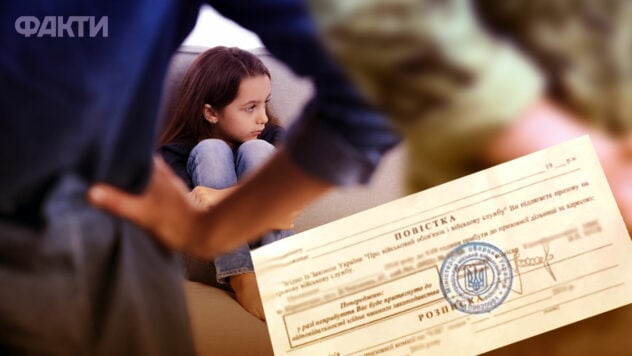Lawyers in Ukraine are sounding the alarm, because with the outbreak of a full-scale war, the number of lawsuits in courts from men who want to either deprive their ex-wife of parental rights or become the sole guardian of their common minor child has increased sharply. In addition, lawyers say that the number of fake divorces, after which men become single parents, has increased.
There are cases when spouses act in collusion, and there are cases when parents try to sue their children from their ex-wives.
ICTV Facts asked the chairman of the Ukrainian Bar Association Committee on Civil, Family and Inheritance Law about the scheme for evading men from mobilization by depriving women of parental rights, Advisor to AGA Partners, lawyer Elena Sibirtseva.
Now watching
The Law of Ukraine On mobilization preparation and mobilization (3544-12, dated October 21, 1993) contains Part 4 of Art. 23, which contains the following wording: men and women who independently raise children under the age of 18 are not subject to conscription for military service upon mobilization as persons liable for military service. This norm no longer contains any additional clarifications.
Mobilization as an incentive
Journalists discovered that before the full-scale invasion, there were not many court decisions about the place of residence of a child in the event of a parental divorce. For example, in 2019 there were only 589 such decisions and only in 133 cases — in favor of the father.
And in 2022 the situation changed dramatically — 859 men received court decisions on cohabitation and child support in their favor. And in 2023, 2,708 such decisions were recorded in Ukrainian courts. Lawyers suggest that this is due to mobilization and the opportunity for men to travel abroad.
Coordinated actions of spouses
First option — this is an artificial dispute. For example, a father files a lawsuit to deprive a mother of parental rights and the woman agrees with the lawsuit. Then a court decision appears, which supposedly should free the father from mobilization.
And here the question is at the discretion of the military command, whether they will accept this document as the only, indisputable and sufficient one or not.
Do you want to relax? Go to Facti.GAMES!
— In my practice, I saw exemption from mobilization based on a court decision as determining the child’s place of residence with his father, but this was back in 2016. When a competent person sees this solution, he understands that it was not artificially created, as it has become recently, — noted lawyer Elena Sibirtseva.
There are many cases when men at the state border presented similar court decisions (determining the child’s place of residence with them), but the border guards responded that this was not enough and other documents were needed, for example, a death certificate of the child’s mother or a decision to deprive her of parental rights . And therefore, there have been more lawsuits in the courts specifically about deprivation of the rights of mothers.
Second option — the father files a lawsuit to determine the child’s place of residence with him. Here the parents can enter into a settlement agreement or the mother admits this claim. The settlement agreement additionally states that the parties have agreed that the child will live with the father. All these decisions then include the wording that the father independently raises the child until the age of 18.
Thus, the essence of all these procedural documents is adapted to Part 4 of Art. 23 Laws of Ukraine On mobilization preparation and mobilization, what parents need.
You can conclude a notarial agreement on the child’s place of residence with one of the parents. The law allows this. The document also states that the child lives, for example, only with his father, he supports him, raises him, and the like. It is difficult to say how many such agreements there are, because such information is not in the public space.
There is another judicial practice that is much discussed in the press, — this is a question that was brought up for consideration by the Grand Chamber of the Supreme Court to establish a fact of legal significance about the child being fully supported and raised by the husband.
According to lawyer Elena Sibirtseva, at a certain stage, a lot of cases appeared in the Register of Court Decisions specifically about establishing a legal fact that concerned the husband’s independent upbringing of a child. In their applications, parents referred to the fact that this legal fact must be established in order to receive, for example, benefits. And without such a court decision, it would seem impossible to do anything.
When parents didn’t agree
It is far from isolated cases when a father, after divorcing his wife, forcibly takes a child from the mother and sues the court to appoint the child’s place of residence with him.
Elena Sibirtseva notes that very often in such claims it is precisely the selfish motive that is hidden, and not a feeling of love and care for the child.
— This is a very complex category of disputes that requires a large amount of evidence. You need to be attentive to how divorce proceedings end, agree in advance with whom the child will live, and enter into appropriate notarial agreements. Because in case of divorce, the place of residence of the child is not decided in court if it is a simple claim, — says the lawyer.
The lawyer advises those who find themselves in similar situations to try to prove that there is a selfish motive in the actions of the second parent, for example, evasion of mobilization.
In her opinion, over time the situation with the manipulation of children may change, because Ukrainian courts are very picky about such cases. Children are always listened to. Previously, it was possible to interview children from the age of 10, but now younger ones can be interviewed, the main thing is that the child can clearly express his thoughts.
How to counter child detention

pexels
Elena Sibirtseva believes that we should try to agree among ourselves with whom the child will live, and conclude a detailed agreement, which is additionally certified by a notary.
If you can’t reach an agreement, you should deal with the legal process in great detail and pay attention to the evidence. Unfortunately, there are many situations when one of the parents does not have a lawyer in court, and time is lost to form the correct position. And when one of the parents decides to contact a lawyer at the appeal stage, it is more difficult to build a position in the same way as is done on a large scale in the court of first instance. This is explained by the fact that it is at the stage of consideration of the case in the court of first instance that all evidence is submitted and interaction with the guardianship and trusteeship authority is carried out.
Are there any legal grounds for the evasion scheme
The legislation does not have a clear list of documents for clause 4 of Art. 23: men and women who independently raise children under the age of 18 are not subject to conscription for military service upon mobilization.
By the way, it cannot be said with certainty that court decisions will help avoid mobilization.
— We will make this issue public. We would really like to hear from the military exactly what documents are the basis for exemption from mobilization and how many real precedents there are when men were exempted from mobilization on the basis of the above-mentioned court decisions, — notes Elena Sibirtseva.
Who can deprive parental rights
Here the answer is clear — this is a court. But this category of disputes is extremely complex.
If the claim is not artificial and one of the parents is categorically against the deprivation of his rights, then the plaintiff may well be refused, because this will be considered an abuse of rights and a violation of the rights of the child. Therefore, it is very naive for one of the parents to hope that the court will easily make the decision he needs. And this is also a rather lengthy process.
On the other hand, if the child has become a victim of a crime on the part of one of the parents or the mother or father is alcohol or drug addicted — this may well become grounds for deprivation of rights to a child.
According to Elena Sibirtseva, the practice of the European Court of Human Rights and, in particular, Ukrainian courts indicates that deprivation of parental rights — This is an extreme measure of responsibility.
How the mobilization evasion scheme involving children works

getty images
One of the parents who initiates a lawsuit either to deprive the other parent of parental rights, or to determine the place of residence with him, must contact a lawyer to file the claim itself.
Next, a list of documents about the personalities of the parents is collected: passport data, characteristics from the place of work, from the place of study, from neighbors, from medical institutions (for example, the child was accompanied to a medical examination by the father) and the like. That is, the court needs to provide documents about the identity of each parent.
The plaintiff can also provide documents about the second parent’s criminal record or his abuse of alcohol or drugs.
Next you need to provide information about the child. You can call witnesses who could tell how each of the parents participates in raising and caring for him, how the child treats each of the parents, with which of them he is safer, etc. There may be manipulation here, since the parent who lives with the child can turn psychologically against the other.
You can also include correspondence between parents on social networks, videos or photographs of spending time together with the child.
That is, the meaning of all this — show that one of the parents participates as much as possible in the child’s life, and the other neutralizes these responsibilities.
The grounds for deprivation of parental rights are given in Art. 164 of the Family Code, and they must be supported by evidence.
At the initial stage, representatives of the guardianship and trusteeship authority must communicate with each of the parents, make a report on the inspection of living conditions, and then provide the relevant conclusions to the court with recommendations on whether to deprive parental rights or determine the child’s place of residence with one of the parents. The court considers all evidence and hears the parties.
It is worth noting that this is not a one-day process, and they can last for years. And we must understand that while the adults are sorting things out, the child is with one of the parents, who can pit him against the other, which is definitely not part of the best interests of the child and a happy childhood.
The court decision can be reviewed

pixabay
If there are doubts about the legality of a court decision, it can be appealed.
In Ukraine there are three stages of litigation:
- first instance — district courtswho make a decision for the first time;
- second instance — appellate courts, where they additionally question the parties, determine whether there was a violation of the law, whether all the circumstances of the case were examined, whether the interests of the child were violated, etc.;
- third instance — Supreme Court — the final stage of appeal, if the decisions of the courts of first and second instance are not satisfied. Usually the review takes place in writing without summoning the parties. It is worth noting that the Supreme Court does not hear all cases in a row, since cases such as divorce are of minor importance.
But the Supreme Court must consider cases of deprivation of parental rights or determination of a child’s place of residence.
The appellate court considers the case on the basis of existing documents and evidence; as a rule, new evidence is not submitted. But this can be done if the party proves that previously, for objective reasons, it was not possible to provide them.
The cassation instance (Supreme Court) considers cases exclusively from the point of view of law — that is, whether there were legal differences with similar cases. New evidence is definitely no longer submitted to the cassation court.
How to understand the true state of the relationship between parents

pixabay
Journalists found an interesting point in one of the court decisions regarding the spouses of Kiev residents Igor and Ulyana Verkhoglyad. The father in court asked to take the child away from the mother without depriving her of parental rights, because the woman allegedly withdrew from raising her. But Ulyana Verkhoglyad’s social networks indicate the opposite — a woman actively publishes joint family photos with her husband and daughter.
According to lawyer Elena Sibirtseva, in fact, before the court hearing, no one will figure out whether the father and mother really do not live together.
— If one of the parties does not submit relevant evidence to the court that the case may be fake and the spouses are in collusion, then the court will not collect this evidence on its own. He has no right to independently collect evidence, — notes the lawyer.
The court will make a decision based on information from the guardianship and trusteeship authorities, who must first communicate with the family, as provided by law. Hypothetically, at this stage, the guardianship authorities may doubt and reveal the fact of collusion. But if the spouses act harmoniously, that is, the father files a lawsuit, and the mother agrees with this, then it is very difficult to check anything here.
The court does not have the task of examining parents, for example, sending them to a polygraph with a question about whether they are really going to court to deprive them of parental rights, or simply want to avoid mobilization. The court, of course, will clarify these facts if it suspects that the dispute is fictitious, but there is a high probability that this will not lead to the refusal of the claim and the fate of the child will still be decided, notes Elena Sibirtseva.
How to prevent mobilization avoidance pattern

pexels
According to the chairman of the Ukrainian Bar Association committee on civil, family and inheritance law, in the Law of Ukraine On mobilization preparation and mobilization it would be advisable to include in the list of grounds for exemption from mobilization, provide clarifications and provide a list of documents that would gave an unambiguous answer to the question: Who is the father or mother who independently raises children under the age of 18?, provide an indicative list of documents that would indicate that the person actually has the right to take advantage of this norm and further raise the child, not going to war.
— In my practice, there have been many such cases where the child actually lives with the father, and the mother has been abroad for a long time and is not interested in the child. The father really takes care of the child and is the only relative for his son or daughter. It is very important that when considering this issue at the legislative level, they do not offend precisely such popes and do not equate them with those who simply abuse their rights for their own benefit, in order to avoid mobilization, — says Elena Sibirtseva.
Sometimes it is very difficult for a father to prove in court that the child really lived with him, that the mother is somewhere abroad and he cannot contact her, or does not even know where she is. The lawyer notes that there are much fewer such cases from men, but they do exist, and legislators also need to think about such parents.

